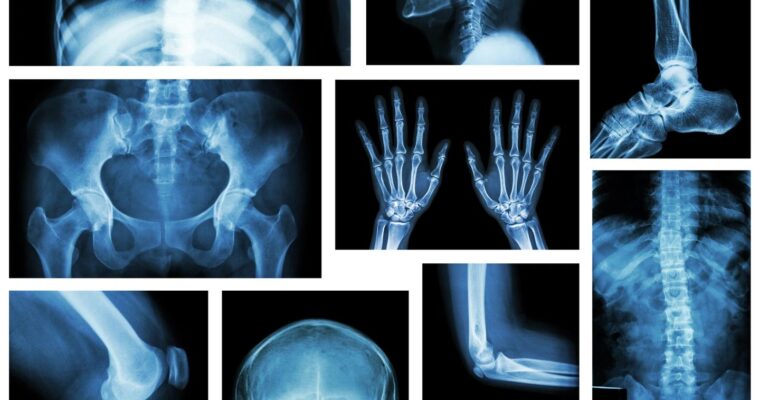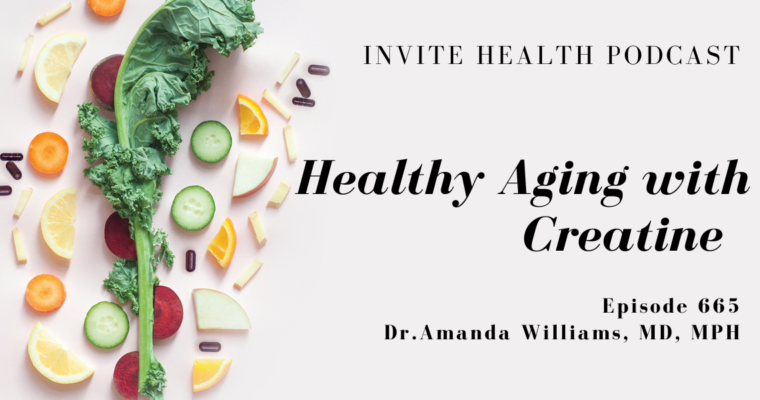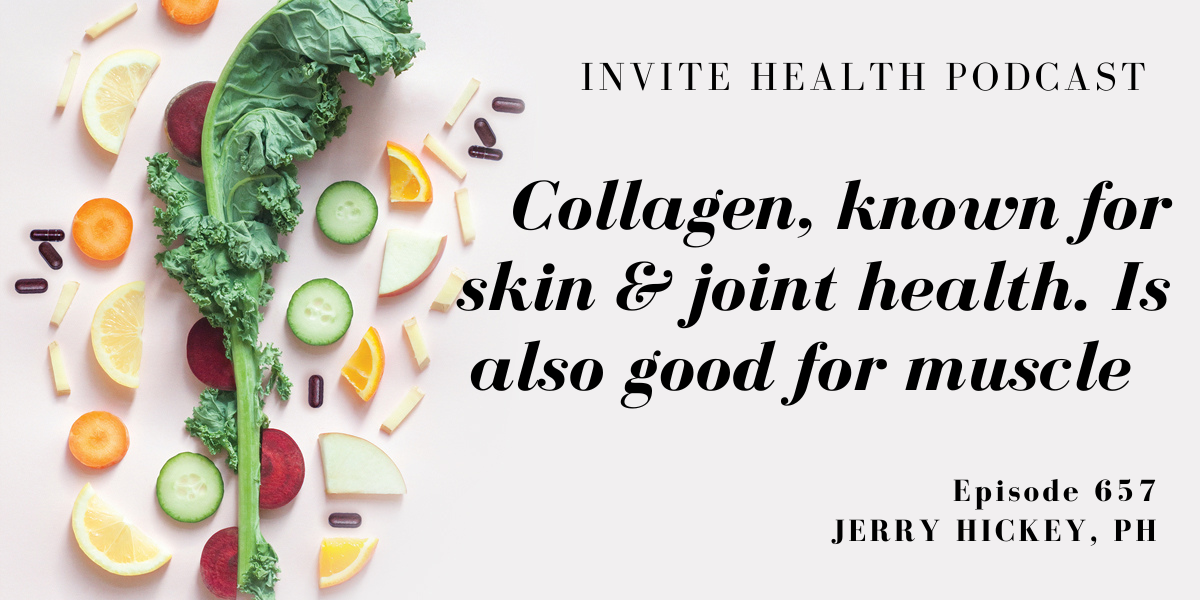Subscribe Today!
Please see below for a complete transcript of this episode.
COLLAGEN KNOWN FOR JOINT & SKIN HEALTH, IS ALSO GOOD FOR MUSCLE, INVITE HEALTH PODCAST, EPISODE 657
Hosted by Jerry Hickey, PH

*Intro Music*
InViteⓇ Health Podcast Intro: [00:00:04] Welcome to the InViteⓇ Health Podcast, where our degreed health care professionals are excited to offer you the most important health and wellness information you need to make informed choices about your health. You can learn more about the products discussed in each of these episodes and all that Invite Health has to offer at www.invitehealth.com/podcast. First time customers can use promo code podcast at checkout for an additional 15% off your first purchase. Let’s get started. † [00:00:34]
*Intro Music*
Jerry Hickey, Ph: [00:00:40] Collagen is a well-known ingredient for joint health, for skin health, and for bone health. It’s the second most common ingredient in the human body after water, and it makes up tissues throughout the body. It makes up 36% of your bone, in fact, that’s what the calcium inserts itself into, it’s called the organic matrix of the bone, what collagen makes. And the calcium actually attaches to that. It makes up 67% of your cartilage and your joints, like in your knee joint approximately. That’s actually where the glucosamine chondroitin embeds itself, so, it’s very important for bone health and for joint health. It makes up about 70% of your skin, that’s what the hyaluronic acid inserts itself in, which is basically the rest of your skin. And it makes up tissue throughout the body, it’s a very important ingredient. But here’s the problem. Once you stop growing in your twenties, the body starts to make less and less collagen per year. So, after the age of 50. We’ve lost a great deal of our collagen. But here’s the thing, it also turns out that collagen is good for your muscle and apparently for your brain to other things that suffer with age. So welcome to my podcast, Collagen, which is known for skin and bone and joint health, is also good for your muscle and apparently for your brain. Hi, my name is Jerry Hickey. I’m a nutritional pharmacist. I’m a licensed pharmacist. I’m also the senior scientific officer over here at Invite Health. You can find all of and watch podcasts for free wherever you listen to podcasts or just go to invitehealth.com/podcast. You can also find Invite on Twitter, Facebook, and Instagram at Invite Health. Of course, all of the information on this podcast episode will be listed in the description. † [00:02:39]
[00:02:40] So, let’s talk about collagen and you and your muscle and your brain. So, if collagen is so important to the body, it’s a real problem when you start to lose it, you have to replace it to make up for the missing you, literally. So, let’s talk about muscle specifically. Once we hit our fifties, we really start to lose muscle. Now, I have to tell you, I was, I wouldn’t say a gym rat, but I spent a lot of time in gyms lifting weights and, you know, on a treadmill and doing sit ups and all that stuff. And I could tell you, if you lift weights and you do all of those exercises, you’re not only don’t lose muscle in your fifties, but you can also gain muscle and strength in your fifties. But for people not doing that, they typically lose about 1.5% of their strength each year after the age of 50. That dynamic accelerates in your sixties and seventies. After age 60, we lose about 3% of our strength each year. So, a 75-year-old man, he could have lost 70% of his strength, of his strength if he doesn’t take steps to prevent that. And there are things you could do. There are definitely things you could do. I’ll talk about some of the other nutrients that are surprisingly good for your muscle. After the I explained about the collagen itself, and of course, proteins always important for muscle. Minerals are important for muscle because they make it function. Plus, minerals work with your nervous system for the twitching of the muscles. So, let’s look at some of the studies on collagen and muscle. But first, let’s talk about collagen quality. There are better sources of collagen. For instance, at Invite, we get our collagen from a French Italian company, it’s called Peptan, its very high quality has to be rich in collagen peptides. Now, collagen is a very big molecule. We call that a high molecular weight. So, they literally have to add some enzymes to break down the collagen so you can absorb it. And that’s good because it liberates collagen peptides. So, it’s easier for you to utilize and are used throughout the body, they’re used everywhere. They make up all of the valves of your body, they make up the lining of your blood vessels, they make your muscle, they make your connective tissue and your nose and your ear lobes and all that. So, they’re used everywhere, and you want to a clean collagen. There are some collagens coming from some countries that are just subpar. They’re low in the peptides and they’re not that clean. And how much do you need? Well, you know, if it’s for the skin, you could probably get away with three grams of collagen a day, three grams of the protein from collagen, if it’s for the joints and the brain, etc, you probably need 5 to 8 grams a day. † [00:05:37]
MAGNESIUM IS THE IGNORED MINERAL FOR BONE STRENGTH, INVITE HEALTH PODCAST, EPISODE 639>>LISTEN NOW!
[00:05:40] So, here are some studies on collagen. This is a study in the Journal of International Society of Sports Nutrition. It’s from Nippon Sports Science University in Japan, but also other academic research institutions in Japan. It’s middle-aged men, their average age was 53, and they’re randomly placed on either collagen or a similar looking powder, but didn’t have the collagen peptides on it, so we would call that a placebo. And on a 29th day of the collagen supplementation and of course these men had at baseline, they checked them at baseline, baseline means the start of the study when they were enrolled, but before they got the collagen, so it’s the start, the inception of the study. Then on the 29th day after taking collagen, all the men performed 40 bodyweight squats. So, I hate squats, never did them, but they’re using weights and they’re doing squats. The squats were divided to five sets, so it’s eight squats at a time, five times, which would definitely be exhausting. Now the collagen, was taken one hour before the exercise and they gave them five grams. Well, you know, like a teaspoon and the collagen reduced fatigue. It significantly reduced fatigue, which is very interesting. The collagen also reduced muscle soreness significantly. I mean, it really made a difference. But the collagen added on to the benefits of the exercise by increasing muscle strength and adding the collagen to the exercise was significantly better than exercise, plus placebo for improving the muscle strength. But the collagen also reduced muscle damage when compared to previous studies. So, our previous studies, they looked at the amount of creatine kinase in the blood and in this study, they looked at the amount of creatine kinase in the blood, but they weren’t focused on that, but they saw that the creatine kinase in this study was lower than in previous studies, so it’s not the best way to do it, but it is some kind of indication. Creatinine kinase is something that when you use your muscle, you break it down and when levels are higher in the blood, it means that there’s been some muscle damage or muscle wasting. Now, I just took some of the studies on collagen and muscle. There’s a lot more to it, I mean, there’s a good amount of research showing that collagen is good for muscle. Do all the studies show this? Yeah, pretty much. Yeah, I mean, it’s pretty much an agreement because as our body ages, we have to supply sufficient collagen to it to counter the natural breakdown of muscle that’s caused by the lack of collagen. Collagen make up a certain percentage of muscle. † [00:08:29]
[00:08:31] So, this is the British Journal of Nutrition. Now they’re looking at older people who are sarcopenic. Now, sarcopenia means the loss of strength in muscle you get in aging, and it could be extreme. So, if it gets too extreme, you have fragility syndrome where you’re shrinking, you’re becoming inactive, all those diseases of aging are creeping into your life, it’s not a good thing. So, these are 53 sarcopenic men, they’re losing strength of muscle. Their mean age was 72, so the middle age was 72. So, they’re probably in their sixties and eighties, sixties through eighties, and they gave them either collagen or placebo during an exercise regimen. They exercised three times a week, it was guided exercise for 12 weeks. You don’t want to hurt themself, now over 12 weeks, there was a real impact with collagen. And of course, this was resistance training. I don’t know if it was with bands or free weights or, you know, some kind of machine, with weights on it that restricts which muscles you use. But it was resistance exercise and taking collagen and these elderly men, this is hard to do, increase their muscle mass. They had bigger muscles, they looked better in their t-shirt and improved their thigh strength, and it was blocking muscle loss better than exercise only. So, that’s a really important point. Stopping muscle loss, better than exercise only in these older men. Now, I have to tell you, I work out with weights every other day or every third day, depending on how hard I push myself. Because I’m almost 70. It takes longer for my muscles to recuperate after I lift weights. So, sometimes after if I exercise Monday, maybe I’m not ready by Wednesday, maybe I have to wait until Thursday. But that’s okay because I don’t want a soft tissue injury which can, in my age can take weeks and weeks to heal, and that can really get in the way of me playing sports and exercising and just, you know, cause pain. So, who needs it? So, after I lift weights, generally, I, I limber up, I do stretching exercises. I get on the bike for 20 to 25 minutes, and then I do more exercise, more stretching, and then I lift weights and then I stretch a little bit after that too. That’s generally my routine, three days a week. But in between that I’m riding my bike out in the street. When I say riding a bike before lifting weights, I’m doing a recombinant bike in my garage, but on other days I’m using a punching bag, I’m gardening, I’m playing pickleball, maybe I’m kayaking, which I don’t do as often as I used to. I no longer live on a lake, so I don’t have the opportunity to kayak as much. But I love kayaking, so that’s not the only exercise I get. I do a lot of walking because you need to get exercise pretty much every day. So, what I do after I work out, I take collagen, I take a product called Collagex HA by Dr. Allan Pressman, it’s a great product, tastes good too. Most collagens taste vile, this one taste good. And then I add to that beta hydroxy beta methyl butyrate, which is better than protein pretty much for muscle. It’s like what protein changes into the build muscle? And then I add to that, to the forte, it’s called Flex Hx, the product, but the ingredients are in the forte for rebuilding my ligaments and tendons. So, that’s what I do after I exercise, and I take that as soon as possible. I put in a shaker, and I shake it up, put water and I drink that, so I don’t take the creatine before I work out. I take it after because your muscle fibers open up after exercise. It’s easy to get these things in there. If I really overdo it with exercise? Which at my age I try not to do. I’ll take a calcium and magnesium and vitamin D because of calcium and vitamin D, you’ll get back into the muscle again and help prevent it from twitching, etc. That’s important. If you like run a marathon or something and your muscles are really, really fatigued, take some calcium and vitamin D to get it back into the muscle and you’ll see that the muscles recover faster. † [00:12:42]
ICYMI:DON’T BE FOOLED BY OZEMPIC, TURN TO NATURE FOR WEIGHT LOSS SUPPORT, INVITE HEALTH PODCAST, EPISODE 656>>LISTEN NOW
[00:12:44] So, here’s a randomized controlled trial from Germany. It’s in the Journal Nutrients, it’s Roar university, and this is young men with an average age of 24. And they took all kinds of measurements at baseline which means they started to study, they enrolled these 25 young men, average age of 24, and they check their strength and their muscle size and their blood levels and everything. And then they gave them a full body workout regimen three times a week for three months. And adding collagen versus placebo powder increased their muscle mass and they also burnt more fat than exercise without collagen, so adding the collagen and even young people improved their muscle mass, they burnt more fat. So, their fat free body mass was improving, the fat was going away. Now their strength improved modestly, it was better in the collagen group. Well, you know, these guys haven’t lost muscle yet. The 50 to 60- to 70-year-olds, the 80-year-olds, it’s improving their strength much better because they’ve lost strength. But a 24-year-old, you still building strength. So, the collagen helped a little bit, so that’s a positive thing. But it was getting them in shape faster, they were losing the fat and getting muscle mass faster. So, here’s the last one I’m going to say about collagen. It’s kind of like a bonus because it’s researchers in the UK, different universities that do research in sports and exercise and fitness in the UK. It’s in the Journal of Amino Acids, I love that journal because proteins are made out of amino acids and you’re basically made out of protein and water with some minerals thrown in and some fat thrown in and some sugars, some body sugars thrown in. But you’re basically protein and water, that’s what we’re made out of. And protein also makes our hormones many of our hormones like insulin and insulin type growth factors and protein makes enzymes that make the body work efficiently, so it’s all interesting. Proteins adjust our ph, so we’re not too acidic or too basic, it’s all important. So, these researchers in the UK are doing a meta-analysis. A meta-analysis is when you take a whole bunch of studies and you group them together, it gives you more people, it gives you more researchers. And if you do it correctly, if you’re picking studies that are well-designed and accurately reported and lacking bias, they really kind of proves that something works or doesn’t work. And usually when you do a meta-analysis, you kind of weaken the results. So, if something should help you 20%, when you do a meta-analysis, it might only help you 12%. That’s just how a meta-analysis works, because they are also picking negative studies and they’re grouping them together. So, if you have 20 great studies that say something works and you have two that say it doesn’t, you know that the 20 is going to outweigh the two. But the two that says it doesn’t work will pull down the average benefit. So, this is 15 studies, mostly in a recreationally fit people, but not always. Some of the times, it’s in older people, even in elderly people. The collagen was improving the ability to exercise because it was reducing muscle soreness, and it was reducing joint soreness. It also benefited bone health, now that’s going to make, that’s going to make sense. Collagen was originally researched for skin grafts and damage to the skin caused by burns. That was some of the original research. So, they were figuring it out, you know, people with third degree burns, can we apply collagen wraps to it? Can we give them collagen? And he found it was helpful. And they also found out that studies show that collagen help people with knee joint pain and hip joint pain, in fact, I have a lot of people report that collagen helps them with their spinal pain because your spine is basically made out of collagen. † [00:16:58]
[00:17:00] So, in this study, looking at these studies and people exercising the collagen was reducing joint pain. It was benefiting joint tissue, it was improving bone health because 36% of your bone, like I said before, is made out of collagen and that’s what the calcium adheres to. And at the same time, collagen was improving strength, muscle size and muscle recovery was sped up. So, collagen with exercise is good, it protects the bones. It actually helps build bone, it protects the joint, it actually improves the ability of the joint to create chondrocytes, little joint cells. It improves the rate of recovery from exercise for sore muscles. It helps build muscle, muscle mass. That’s very important for us, older people. And it helps build strength and helps older people regain strength. So, now, you know, I thought I’d have time to do the brain stuff on collagen. I think I’ll have to do that as a separate podcast. So, I want to thank you for listening and this is Jerry Hickey signing off. But before I go, if you could subscribe and leave a review, that would be helpful for us and you can find all of the Invite, you know, I gave you all the info before, but you can find the InViteⓇ Health Podcast episodes wherever you listen for free or just go to invitehealth.com/podcast. Thanks for listening. Have a great day, rest of the day and I’ll speak to you soon, hopefully. † [00:17:00]
*Exit Music*











